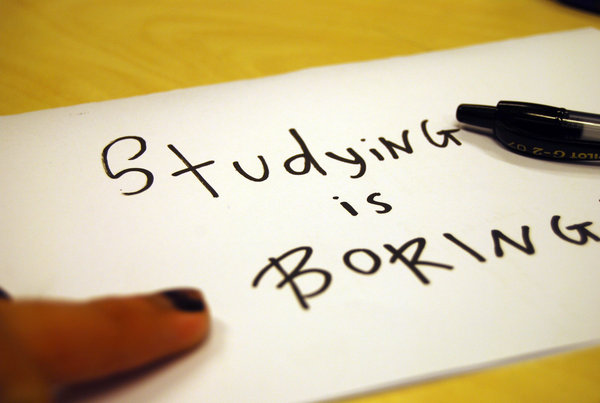More Interesting, Efficient, and Effective Ways to Study
by David Pierce

As I’ve mentioned before, most people don’t study effectively by sitting and reading notes over and over, until they’re fried in our brains. The human brain doesn’t work that way. It’s a more complex, disordered, and fun-loving being. Memories of things you do and did, and enjoyed, are always more prevalent to your brain than to that 80-page study guide you wrote for your exam.
That said, it’s relatively easy to tweak your study habits ever so slightly, and make studying more interesting, efficient and effective. There are a ton of ways out there, but I’ll give you seven that have worked for me. (These aren’t all more fun than a barrel of monkeys, but they’re all more interesting than sitting and reading notes over and over.)
1. Repetitive Repetition Take everything you’ve done in the semester. Notes, homework, papers, etc. Now fit all of that onto one page, front and back. Fill it with the information you really need to know. This will inform how you study, as well as help you look past the pointless details and really get to the heart of the information. This shouldn’t be the only studying to do, but it’s a great place to start, and a way to focus yourself.
2. Play Teacher Find someone who knows nothing about what you’re studying for. Then teach them about it. In figuring out how to make someone else understand the material, you’ll do wonders for your own mastery. It’ll stick in your brain better, as well as give you a clearer view of the subject. Run through all the critical course material at warp speed, and you’ll be amazed how much you learn from hearing yourself talk.
3. Draw I wrote a bit about this in a previous post, but it merits repeating: most people’s brains do not work in a linear fashion. This doesn’t work with all subject, but will with many. Draw pictures, or mind maps, or diagrams, or graphs of the material. The repetition associated with putting it together, as well as the visual act, will help you memorize and understand material in a whole new way. It engages the other side of your brain, which is critical to really remembering material. What you draw doesn’t matter- just let the artist come out.
BLABLA
4. Headphone Osmosis For anyone with an iPod, there are a vast number of resources out there to help you learn, from Sparknotes to videos to podcasts. For a huge list of things you can do with your iPod to help you learn and study, check out “100 Ways to Use Your iPod to Learn and Study Better.”5. Reward Thyself Give yourself something for studying, that isn’t just more work to do. When you sit down, decide that if you study hard for 40 minutes, you’re going to eat some ice cream. Or, if you study hard for 2 hours, you can go to bed. This helps focus you on the task at hand, keep you from being distracted, and also lets you have some fun in your life. If all you do is study, burnout happens incredibly fast. Balance it with friends, fun, and rest, by rewarding yourself for a job well done.
6. Bingo! Many classes offer “key terms” for tests, or terms you need to be able to define on the exam. My favorite way to study these is with a group. Make a bingo board for yourself out of the key terms, whatever size you want. Then, have someone read definitions out loud, and you find the term on your bingo sheet when you know who or what it is. Play for money, prizes, bragging rights, whatever- it’s a fun game, gets you engaged in really knowing the terms, and helps you remember for the test. Prep time on this one’s a little long, but it’s worth it.
7. Fight Pick a friend, and a topic for a class (this one may not work with, say, math). Pick sides, and have a debate with each other. This is great for essays, papers, and any kind of test requiring you to elaborate on one or a few points. Debating, even a side you know is wrong, is an incredible useful skill, and does wonders for your ability to reason through information on a test. If you can argue both sides, you can argue one side much more effectively.
Studying works the same way for most people: it consists of reading, reading, reading, and reading. It shouldn’t. With these tips, and many more that you can come up with, you can make studying both more fun and more worthwhile.
0 komentar:
Posting Komentar